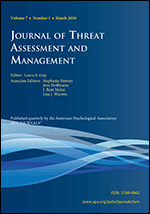Risk assessment challenges in a specialized clinic for individuals referred for violent extremism
Abrégé
In the field of forensic psychology, assessing the risk for violence is a core component of treatment planning and intervention monitoring. However, practitioners from the violent extremism (VE) field currently lack guidance on which tools to use when addressing the risk of VE in individuals with mental disorders. This study details challenges associated with risk assessment in a specialized clinic providing services for individuals with mental disorders referred because of concerns about VE, describes an approach to risk assessment for these individuals, and examines its perceived utility for clinicians. A mixed-method concurrent triangulation design was used to combine available quantitative data on the risk assessment of individuals referred to the Montreal Polarization team, obtained through a file review (n = 53), with qualitative data collected through clinical ethnography and a focus group with practitioners who use the Short-Term Assessment of Risk and Treatability and Terrorist Radicalization Assessment Protocol–18 tools. Results suggest that risk assessment for patients attracted to VE is complex. Clinicians often combine structured instruments for persons with mental disorders with those for individuals on VE trajectories because they address different dimensions of risk. Disagreement in the level of risk seemed to reflect biases related to the therapeutic alliance and to societal prejudices, and may indicate the need for continuous monitoring. Structured clinical judgment approach tools, while perceived as useful in the VE field, may benefit from better integration with more traditional tools developed for forensic and mental health populations. The limits of cross-sectional data in risk assessment tool validation call for more prospective and longitudinal research in the field. (PsycInfo Database Record (c) 2023 APA, all rights reserved)
Members and SHERPA Teams

Cécile Rousseau
Professor, Division of Social and Transcultural Psychiatry, Université McGill


